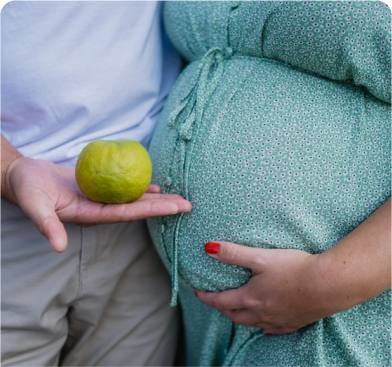Folic Acid
Folic acid, a B vitamin, helps to prevent neural tube defects, such as spina bifida, during the first 30 days of pregnancy. Before, and during, pregnancy, avoid taking dietary supplements with more than 10,000 International Units (I.U.) of vitamin A. While vitamin A is beneficial for many reasons, excessive levels of preformed vitamin A (retinol) may cause birth defects. Look for a dietary supplement with the majority of vitamin A as beta-carotene.
Iron
Iron is another nutrient of concern for women in their childbearing years.. While it’s important to be adequately nourished with an array of nutrients during pregnancy, iron stands out because suggested intakes increase significantly after conception.
Iron helps the body transport oxygen, prevent anemia in mom, and reduce the risk of preterm and low birth-weight babies. No matter how balanced your pregnancy diet, it’s difficult to get the iron you need from food alone. Health experts recommend pregnant women take supplemental iron every day.
B-Vitamins
Here is some news that might bring a smile to your face: Vitamin D may be good for your teeth too. As you read above, vitamin D helps with calcium absorption. Just like your bones, your teeth are composed of calcium. Research shows that vitamin D’s positive effect on calcium absorption may help strengthen teeth too. In fact, in one controlled study, supplementing with vitamin D helped reduce cavities in children by 47%. For a healthy smile, you don’t need to go overboard on your vitamin D intake. Just aim to get the recommended amount of vitamin D each day through foods, sunlight, or a multivitamin with vitamin D—and this will help you in the right direction.
Iodine
Iodine is a mineral involved in baby’s brain development. Iodized salt and seafood are rich in iodine.
Omega-3
Seafood is also a source of omega-3 fats. One omega-3 fat, docosahexaenoic acid (DHA), helps to support your child’s brain and visual development during pregnancy, breastfeeding, and in the first few years of life. For this reason, and others, it is recommended for pregnant and nursing women to eat fish twice weekly. If you don’t eat the recommended amount of fish, omega-3 supplements help fill the gap.
e). Vitamin D and Happiness
You would think that the suggested intakes for all nutrients would increase during pregnancy, but that’s not true for calcium and vitamin D. However, many women don’t consume enough of these bone-building nutrients before they conceive, and may not get enough during pregnancy. Calcium is necessary to build baby’s bones and teeth, and to maintain the strength of mom’s skeleton, too. Vitamin D is essential for calcium absorption by the body.
Vitamin-D fortified milk is an excellent source of calcium and vitamin D. However, while three eight-ounce glasses of milk supplies adequate calcium for pregnancy, you’d need to drink six glasses to satisfy the suggested vitamin D intake. If you don’t eat at least three servings of dairy or calcium-fortified foods daily, you may need extra calcium. Most dietary supplements supply the majority of the vitamin D suggested during pregnancy, and food can supply the rest.
Once you deliver, your body begins to return to its normal state before pregnancy. If you’re breastfeeding, you need to take extra care of yourself during this time.
Eating right provides you with the fuel and nutrients you need to recover from pregnancy, but you may skimp on healthy foods because you’re busy. Try, as much as possible, to eat nutritious meals and snacks. Nutrition is a high priority for breastfeeding women. In addition to healthy lifestyle habits, diet determines the quality and quantity of breast milk. Some nutrient needs, including those for vitamins A and E, certain B vitamins, vitamin C, and iodine, are actually higher during breastfeeding than during pregnancy. Whether breastfeeding or not, finish the remainder of your daily prenatal vitamins, along with other necessary supplements such as calcium. When your prenatal supplements are gone, start taking daily multivitamins




